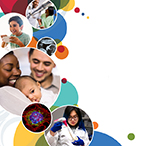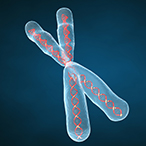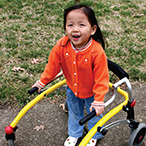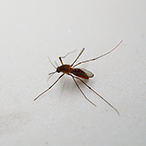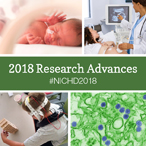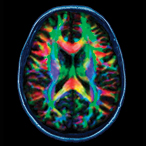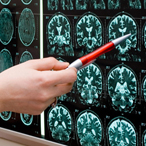NICHD Director Dr. Diana Bianchi looks back at 2019 and NICHD’s many amazing accomplishments.
News
NICHD issues News Releases and Media Advisories to the news media. Spotlight and Research Feature articles explain NICHD research findings and public health issues to the general public. An Item of Interest is a short announcement of relevant information, such as a notable staff change.
Item of Interest: Now Available: NIH Research Plan on Fragile X and Associated Conditions
The Trans-NIH Fragile X Coordinating Committee, led by NICHD, recently published the final NIH Strategic Research Plan on FMR1-Associated Conditions.
Science Update: Fragile X carriers may be at higher risk for several health conditions, NIH-funded study suggests
Carriers of the FMR1 premutation—a mutation in the gene associated with the developmental disorder Fragile X syndrome—may have a higher risk for several health conditions, according to an analysis funded by the National Institutes of Health.
Item of Interest: Four NICHD Grantees Honored with PECASE Award
Four NICHD grantees will be honored July 25 in Washington, DC, with the Presidential Early Career Award for Scientists and Engineers. More than 300 researchers across the country are award recipients, the White House announced July 2.
Spotlight: NICHD Looks Back on 50 Years of Learning Disabilities Research
NICHD’s contributions to research on learning disabilities highlight decades of studies that informed the identification, recognition and treatment of these disorders.
Item of Interest: Focus on FMR1: NIH Invites Comments on its Research Plan on Fragile X and Associated Conditions
NIH invites scientists, advocacy and family groups, representatives from federal and local agencies, and others to provide comments and suggestions on its draft research plan on Fragile X syndrome and associated conditions.
Spotlight: How artificial intelligence and other new technologies are advancing healthcare
Scientists and engineers are pioneering new tools and methods to advance healthcare in revolutionary ways. Learn about emerging technologies funded by NICHD.
Item of Interest: Interested in Medical Rehabilitation? NIH Wants to Hear from You
NIH invites comments on its Plan of Rehabilitation Research to help update the plan.
Science Update: Arthritis drug reduces Zika birth defects in mice, according to NIH-funded study
An arthritis drug reduced the severity of Zika virus-related birth defects and improved survival among baby mice, according to a study funded in part by the National Institutes of Health.
Media Advisory: NICHD chronicles its major research advances of 2018
As 2018 winds down, a new slideshow highlights a selection of initiatives, therapies, and scientific advances supported by NIH’s Eunice Kennedy Shriver National Institute of Child Health and Human Development (NICHD).
Spotlight: Selected NICHD Research Advances of 2018
In 2018, researchers funded by NICHD made significant progress in advancing the health and well-being of infants, children, teenagers, and adults across the United States and around the world.
Podcast: Rethinking Disability: The Egans and Down Syndrome
Dr. Kathleen Egan and her son David Egan, pioneers of inclusion for people with Down syndrome, share their experiences. Listen.
Spotlight: Highlighting Research on Attention Deficit/Hyperactivity Disorder
NICHD’s mission includes understanding child development and behavior. Check out these scientific advances related to Attention Deficit/Hyperactivity Disorder.
Release: NIH launches INCLUDE Project
New trans-NIH INCLUDE Project will focus on improving the health and well-being of people with Down syndrome, while also studying risk and resilience factors for common diseases, such as Alzheimer’s disease and cancer.
Release: Atypical brain development observed in preschoolers with ADHD symptoms
NIH-funded study uses high-resolution brain scans to uncover structural changes.
Spotlight: Selected NICHD Research Advances of 2017
Over the past year, NICHD contributed to numerous scientific advances and key initiatives.
NIH awards nearly $100 million for Autism Centers of Excellence program
The National Institutes of Health has awarded nine research grants totaling nearly $100 million over the next five years for the Autism Centers of Excellence (ACE), a program that supports large research projects aimed at understanding and developing interventions for autism spectrum disorder (ASD).
Children’s visual engagement is heritable and altered in autism
How children visually engage with others in social situations is a heritable behavior that is altered in children with autism, according to a study funded by the National Institutes of Health.
The NIH NeuroBioBank: Addressing the Urgent Need for Brain Donation
NICHD Director Dr. Diana Bianchi and colleagues from other NIH Institutes discuss this valuable research resource.
Socioeconomic disadvantage linked to immune activity during pregnancy
Infants born to mothers in poverty had a greater chance of developing neurological problems within the first year of life, according to a study by researchers at the National Institutes of Health (NIH) and Harvard University.
 BACK TO TOP
BACK TO TOP
